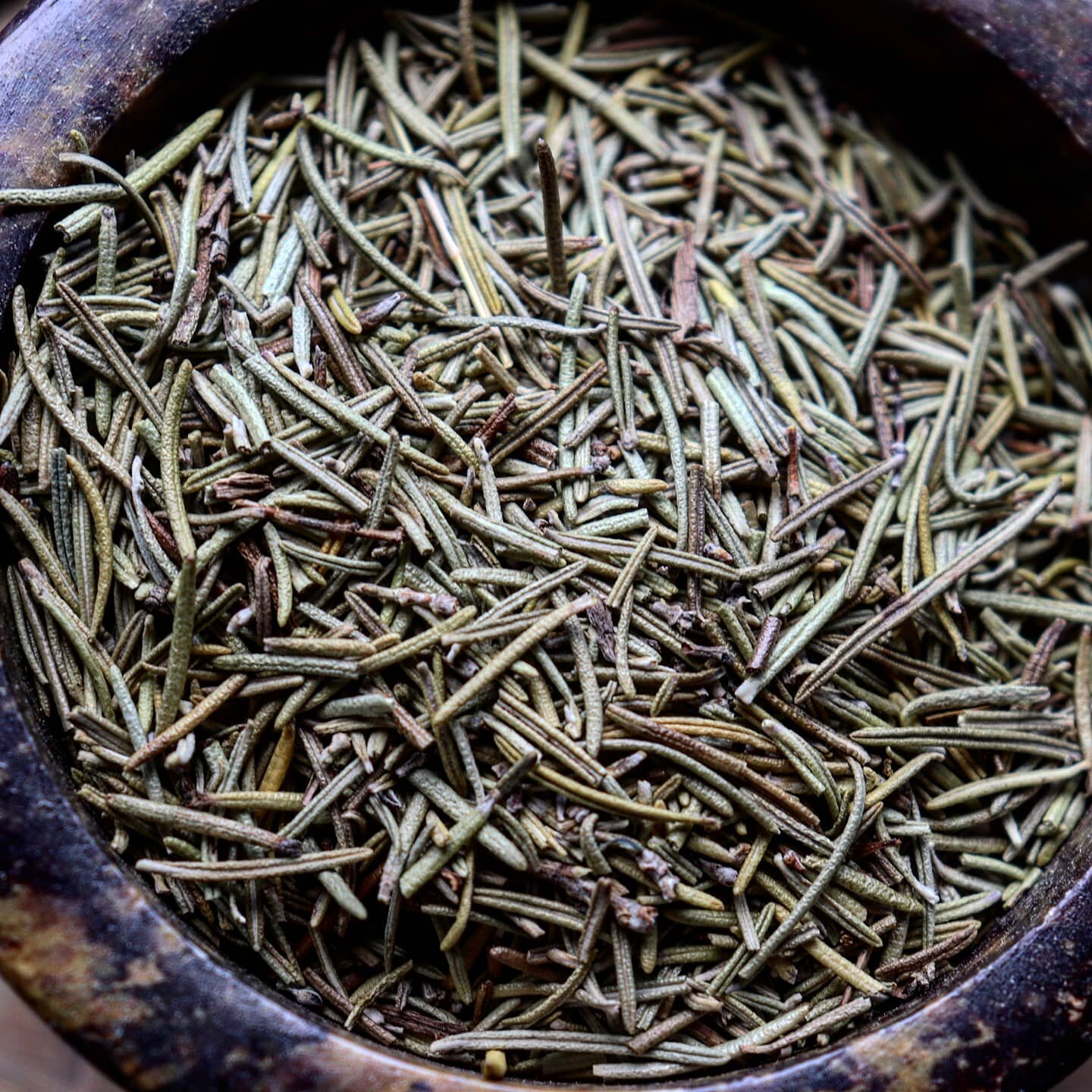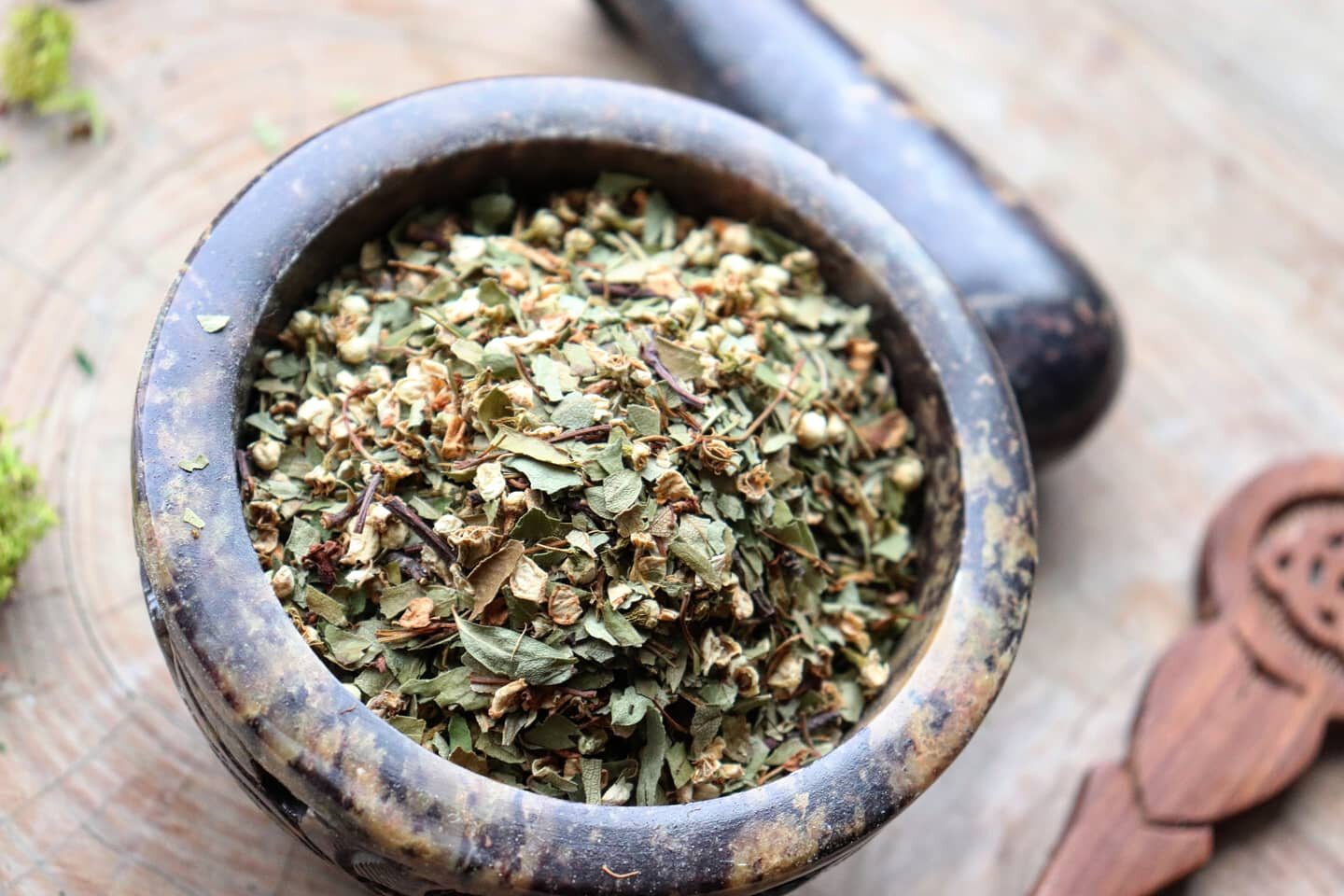Juniper Berries
Juniperus communis
USDA organic & Kosher
Whole Berries—available in 1 ounce or 1/2 ounce and packaged in a plastic pouch.
Juniper berries are regarded for their healthful properties and the wood for its usefulness in crafts. The purple-blueish berries are actually a fused seed cone and are harvested in early autumn. Juniper berry has a strong taste and is added sparingly to culinary recipes. The berries can also be tinctured and added to liquors for their herbaceous flavor.
To prevent loss of essential oil, juniper berries should not be ground, crushed, or rubbed until just before use. May be taken as a tea, extract or capsule, and may be liberally sprinkled on food or added to drinks and smoothies. Today, the best-known use of juniper berries is the main flavoring agent in gin.
History + Folklore
The juniper is an evergreen tree native to Europe, Asia, and the northern parts of North America and it is especially abundant in central Texas and Eastern Oregon. The history and folklore concerning the juniper tree is long reaching. The first recorded mention of use is in an Egyptian papyrus from 1500 B.C.E. Juniper was the symbol of the Canaanites fertility goddess Ashera. Western European folklore tells that is a juniper tree is planted by the door to your home, a witch cannot enter. Juniper incense has also been used by the Scottish to ward off the evil eye, and by the Tibetans to remove demons. The purple, blue, violet, or blackish-brown fruits are harvested in early autumn for culinary and medicinal use. Juniper belongs to the Cupressaceae plant family.
The Story entitled Red Riding Hood2 in the book The Hero of Esthonia tells of a mother laying down juniper branches and making the sign of the cross over them to protect her sleeping children from devils. In the story The Compassionate Shoemaker in the same book, the devil is defeated by being struck by a staff of juniper.
Magickal
Protection, Anti-Theft, Love, Exorcism, Health
Masculine, Sun, Fire
Use throughout Europe as a protective herb. Grounded and used as in incense, Juniper helps psychic powers, breaks hexes and curses.
Warnings: Use with caution in persons with inflammatory kidney disease. Not for those that are pregnant. Not for use exceeding six weeks in succession. Processed in a facility that also produces tree nuts. Tree nut fragments may be occasionally present.
Juniperus communis
USDA organic & Kosher
Whole Berries—available in 1 ounce or 1/2 ounce and packaged in a plastic pouch.
Juniper berries are regarded for their healthful properties and the wood for its usefulness in crafts. The purple-blueish berries are actually a fused seed cone and are harvested in early autumn. Juniper berry has a strong taste and is added sparingly to culinary recipes. The berries can also be tinctured and added to liquors for their herbaceous flavor.
To prevent loss of essential oil, juniper berries should not be ground, crushed, or rubbed until just before use. May be taken as a tea, extract or capsule, and may be liberally sprinkled on food or added to drinks and smoothies. Today, the best-known use of juniper berries is the main flavoring agent in gin.
History + Folklore
The juniper is an evergreen tree native to Europe, Asia, and the northern parts of North America and it is especially abundant in central Texas and Eastern Oregon. The history and folklore concerning the juniper tree is long reaching. The first recorded mention of use is in an Egyptian papyrus from 1500 B.C.E. Juniper was the symbol of the Canaanites fertility goddess Ashera. Western European folklore tells that is a juniper tree is planted by the door to your home, a witch cannot enter. Juniper incense has also been used by the Scottish to ward off the evil eye, and by the Tibetans to remove demons. The purple, blue, violet, or blackish-brown fruits are harvested in early autumn for culinary and medicinal use. Juniper belongs to the Cupressaceae plant family.
The Story entitled Red Riding Hood2 in the book The Hero of Esthonia tells of a mother laying down juniper branches and making the sign of the cross over them to protect her sleeping children from devils. In the story The Compassionate Shoemaker in the same book, the devil is defeated by being struck by a staff of juniper.
Magickal
Protection, Anti-Theft, Love, Exorcism, Health
Masculine, Sun, Fire
Use throughout Europe as a protective herb. Grounded and used as in incense, Juniper helps psychic powers, breaks hexes and curses.
Warnings: Use with caution in persons with inflammatory kidney disease. Not for those that are pregnant. Not for use exceeding six weeks in succession. Processed in a facility that also produces tree nuts. Tree nut fragments may be occasionally present.
Juniperus communis
USDA organic & Kosher
Whole Berries—available in 1 ounce or 1/2 ounce and packaged in a plastic pouch.
Juniper berries are regarded for their healthful properties and the wood for its usefulness in crafts. The purple-blueish berries are actually a fused seed cone and are harvested in early autumn. Juniper berry has a strong taste and is added sparingly to culinary recipes. The berries can also be tinctured and added to liquors for their herbaceous flavor.
To prevent loss of essential oil, juniper berries should not be ground, crushed, or rubbed until just before use. May be taken as a tea, extract or capsule, and may be liberally sprinkled on food or added to drinks and smoothies. Today, the best-known use of juniper berries is the main flavoring agent in gin.
History + Folklore
The juniper is an evergreen tree native to Europe, Asia, and the northern parts of North America and it is especially abundant in central Texas and Eastern Oregon. The history and folklore concerning the juniper tree is long reaching. The first recorded mention of use is in an Egyptian papyrus from 1500 B.C.E. Juniper was the symbol of the Canaanites fertility goddess Ashera. Western European folklore tells that is a juniper tree is planted by the door to your home, a witch cannot enter. Juniper incense has also been used by the Scottish to ward off the evil eye, and by the Tibetans to remove demons. The purple, blue, violet, or blackish-brown fruits are harvested in early autumn for culinary and medicinal use. Juniper belongs to the Cupressaceae plant family.
The Story entitled Red Riding Hood2 in the book The Hero of Esthonia tells of a mother laying down juniper branches and making the sign of the cross over them to protect her sleeping children from devils. In the story The Compassionate Shoemaker in the same book, the devil is defeated by being struck by a staff of juniper.
Magickal
Protection, Anti-Theft, Love, Exorcism, Health
Masculine, Sun, Fire
Use throughout Europe as a protective herb. Grounded and used as in incense, Juniper helps psychic powers, breaks hexes and curses.
Warnings: Use with caution in persons with inflammatory kidney disease. Not for those that are pregnant. Not for use exceeding six weeks in succession. Processed in a facility that also produces tree nuts. Tree nut fragments may be occasionally present.
For the list of herbal correspondents, click on the herb. 🌿
Our products are not intended to diagnose, treat, cure, or prevent any disease. These items are purely informational and curios. Humans are complex; therefore, results may vary depending on consumption and individual physiology. ShadowCraft and affiliates are not responsible for consequences as a result of the misuse and misrepresentation of our products.
Please be advised that you are on a site that promotes the use of and sells homeopathic & herbal supplement products that have not been evaluated by the FDA. All products sold are intended for spiritual and entertainment purposes and have no guaranteed outcome or results. The buyer assumes all responsibility for items once purchased.
As with all handmade items, the listing image may vary compared to the product received. Please refer to our shop disclaimer for additional warnings and information.













